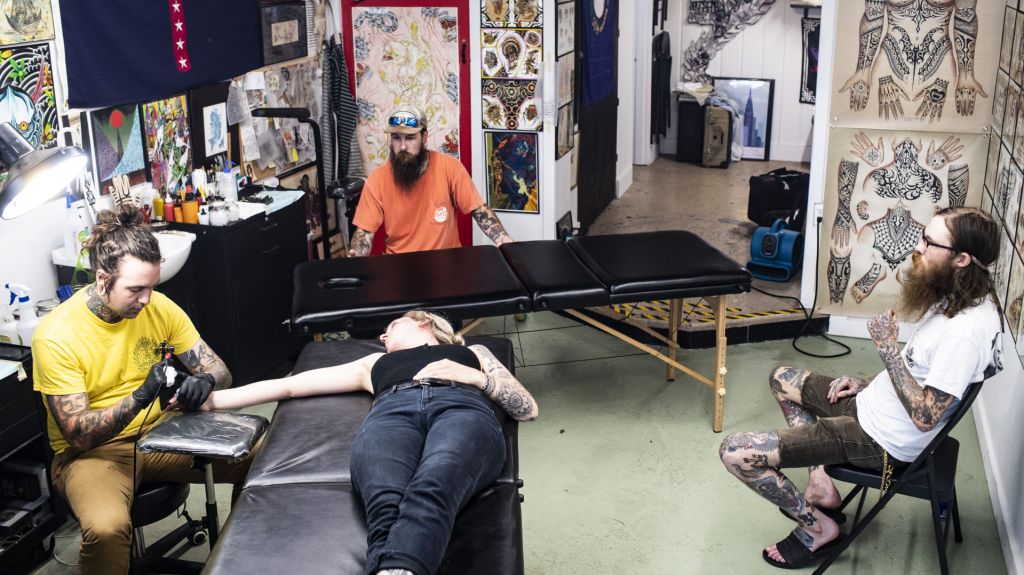Tattoo studios await answers on controversial proposal
Published 7:45 am Tuesday, June 18, 2019

- Aaron Carmody (left) tattoos Leslie Dobbins with shop owners Frank Armstrong (center) and Ben Butts (right) Monday at Tattoo Heartland.
The Kentucky Cabinet for Health and Family Services proposed in April new regulations for tattoo studios on cleanliness procedures, registration with the health department, registration fees, annual inspection fees and facility requirements.
The 22-page document included one line that left more questions than answers: “Tattooing of scarred skin is prohibited.”
Trending
Public outcry soon followed, which the cabinet gathered in part through a six-week public comment period.
“The state is currently in the process of responding to 700-plus public comments regarding the proposed tattoo regulation,” said Christina Dettman, executive director of public affairs for the Kentucky Cabinet for Health and Family Services, in an email. “They are working on updating (and) making some changes to the proposal and will likely have a final version in a few months.”
That leaves the 1,337 licensed tattoo artists in Kentucky wondering what’s next for their businesses.
Frank Armstrong and Ben Butts, who recently opened Tattoo Heartland in downtown Bowling Green, expressed concern about the lack of transparency in the vague proposal and the apparent lack of research.
“It opens a whole new host of questions,” Armstrong said, such as “why are we donating our time and energy as a state to this very minute thing?”
Transforming scars from self-harm cuts, traumatic car accidents or double mastectomies into “beautiful tattoos” can be powerful for clients, according to Butts, who has been inking skin for the past eight years.
Trending
“It can be life-altering for them. They’ll cry happy tears,” Butts said.
Both Butts and Armstrong believe it’s already the artist’s responsibility to examine clients for signs of potential irritation. The tattoo artists ask when the client got the scars or if he or she has keloid scars. Often, they can recognize the signs of new scars.
“You should know if you see enough of them,” Butts said.
Mike Millirones, a third-generation tattoo artist who has been in the business for nearly two decades, opened The Mad Tatter in Bowling Green several years ago. In his experience, covering scars is a common practice.
“Scars can make people self-conscious, whether it was intentional (or) unintentional,” Millirones said. “A lot of people just don’t want to see them anymore. It brings back bad memories.”
While tattooing over fresh scars could be problematic, professional tattoo artists examine the skin area beforehand and inform clients of potential issues, according to Millirones, who also pointed out that people might not realize how easy it is for people to get scars on their body – such as scraping a shin against a bike pedal or getting scratched arms when dogs jump.
“There’s just so many different circumstances,” Millirones said. “You can’t put a ‘one size’ on everything.”
Under the proposal, tattooing would be prohibited “on skin which has a rash, pimples, evidence of infection, open lesions, mole, sunburn, or manifests any evidence of unhealthy conditions without written clearance by a medical physician licensed by the Kentucky Board of Medical Licensure.”
There would also be new registration fees for studios and individual artists, from $20 each to $400 and $100, respectively.
State officials said the new proposal was supposed to address changes that occurred in the industry since regulations were updated 15 years ago – including addressing “potential health issues of tattooing over unhealthy skin, including recent or healing scar tissue.”
“The specific language in the proposed regulation had some unintended consequences and will be addressed,” Department for Public Health Commissioner Dr. Jeffrey Howard said in a statement.






